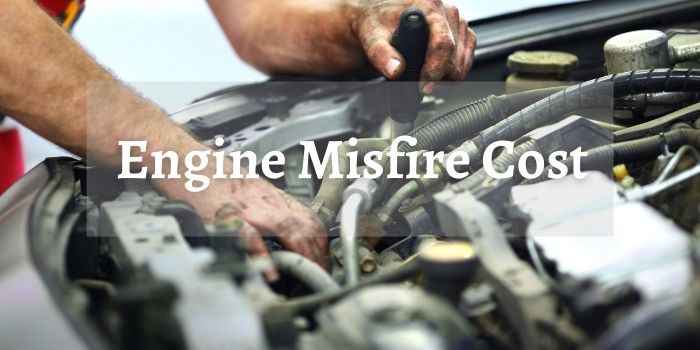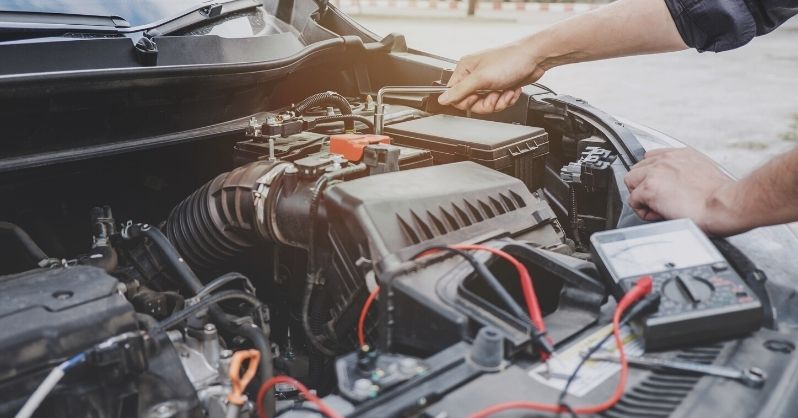An engine misfire must be tended to fast so further damage can be avoided. Click here to find how much fixing engine misfire costs.
We’ve all been there. You’re driving along, minding your own business, when you hear a strange noise coming from the car. Next thing you know, your engine is misfiring, and you’re stuck on the side of the road.
Cars are an essential part of our everyday lives, and things become very challenging when they start acting up. Engine misfire is one of the most common causes behind it.
Thankfully, fixing an engine misfire is easy in most cases. So, how much does the fix of an engine misfire cost? Keep reading to find out!

Can A Misfiring Engine Be Fixed?
Yes, a misfiring engine will usually have an easy fix. These can often be fixed with a tune-up or by replacing the spark plugs.
However, if the problem persists, it could be indicative of a more serious issue, such as a cracked cylinder head or blown gasket. In these cases, it is best to consult a trained mechanic for diagnosis and repair.
How Much Does It Cost to Fix Misfiring Cylinders?
One of the most common engine problems is a misfiring cylinder. When a cylinder misfires, it means that the fuel mixture is not detonating properly.
Although the issue is quite severe, it might be fixed at a low cost if you’re lucky enough. On average, the fixing of an engine misfire costs from $20 to $1200.
Here are some of the components that may require replacement for fixing engine misfire.
- Spark Plug: $20-$150
- Ignition Coil Replacement: $50-$200
- Distributor Replacement: $40-$125
- Valve Adjustment: $25-$350
- Fuel Injector Replacement: $150-$900
What Causes an Engine Misfire?
Here are some of the reasons that may be causing an engine misfire in your vehicle.
Bad Spark Plugs
A spark plug is a small device that helps to ignite the fuel in an engine. spark plugs can cause an engine to misfire if they are not working properly.
Although it may seem like a daunting task, replacing spark plugs is quite easy. Here’s how to do it:
- Remove the old spark plugs.
- Clean the spark plug holes.
- Put the new spark plugs in.
- reconnect the spark plug wires.
- Start the engine and check for any leaks.
Bad Ignition Coils
The ignition coil is a key component of any internal combustion engine. Its job is to convert the low voltage from the battery into the high voltage needed to ignite the spark plugs. When an ignition coil is damaged, it can cause the engine to misfire.
Replacing a damaged ignition coil is a relatively simple process, but it’s important to follow the instructions in your car’s owner’s manual.
First, remove the spark plug wire from the bad coil. Next, detach the coil from its mounting bracket and unscrew it from the engine.
Finally, screw in the new coil and reattach the spark plug wire. Once you’ve completed these steps, your engine should be running smoothly again.
Bad Distributor or Wires
A distributor is an important component of a car’s ignition system. It helps to distribute the correct amount of voltage to each spark plug at the correct time.
To replace the distributor, first, disconnect the battery and remove the distributor cap. Next, unscrew the hold-down clamp and lift out the distributor.
Be sure to use new gaskets and O-rings, and to tighten the hold-down clamp securely.
Unadjusted Valves
When an engine misfires, it means that one or more of the cylinders are not firing correctly. One common cause of this problem is unadjusted valves or distributor wires.
The valves in an engine help to regulate the intake and exhaust of air and fuel. Over time, they can become worn down or out of alignment, causing the engine to run less efficiently.
Bad Fuel Injectors
One problem that can cause a fuel injector to fail is an accumulation of dirt and debris. Another issue that can cause a fuel injector to fail is an electrical problem.
If you suspect that your car’s engine is misfiring because of a bad fuel injector, you should take it to a mechanic for inspection. If they confirm that a bad fuel injector is indeed the cause of the problem, they will be able to replace it with a new one.
Replacing a bad fuel injector is not a difficult task, but it is best left to professionals who have the necessary tools and equipment.
How Much Does It Cost to Diagnose a Misfire?

An engine misfire can indicate a problem with the engine itself, or with one of its many subsystems.
To diagnose the problem, a mechanic will first take a look at the engine’s computer system to see if there are any error codes stored. If there are, that can give a good indication of where to start looking for the problem.
The cost of diagnosing a misfire can vary depending on the complexity of the problem and the type of vehicle. However, most engine misfire diagnostic costs fall in the range of $100 to $200.
Can A Misfire Ruin an Engine?
yes. A misfire occurs when the air/fuel mixture in the cylinder doesn’t ignite. This can be caused by a spark plug that is not firing, incorrect timing, or low compression. If a misfire occurs, the engine will run rough and may produce a knocking sound.
A misfire can cause severe damage to the catalytic converter, and if left unchecked, can cause engine failure. Ignoring a misfire can result in serious engine damage that may be costly to repair.
Can You Drive with A Cylinder 4 Misfire?
It’s not advisable to drive a car with an engine misfire. There are a few reasons for this. First, when an engine misfires, it’s not operating at peak efficiency. This means that the car will use more fuel and produce more emissions.
Second, a misfiring engine can damage other parts of the engine, including the catalytic converter. Finally, a misfiring engine can be dangerous because it can suddenly stall, leaving you stranded on the side of the road.
How Far Can I Drive with A Cylinder Misfire?
If you’re wondering how far you can drive with a cylinder misfire, the answer depends on a few factors. First, it’s important to identify which cylinder is misfiring.
A miscoding spark plug or defective injector in one cylinder may not cause much damage, but if more than one cylinder is affected, it can lead to engine damage.
Second, you’ll need to consider the severity of the misfire. A light misfire may not do much damage, but a severe misfire can cause engine damage quickly.
Finally, you’ll need to consider the conditions under which you’re driving. If you’re driving in hot weather or at high speeds, the misfire will do more damage than if you’re driving in cooler weather or at lower speeds.
In general, it’s best to get the problem fixed as soon as possible to avoid further damage.
Conclusion
Well, it looks like we’ve come to the end of our little misfire journey. We hope you found this post helpful – after all, no one wants a misfiring engine!
To sum it up, there’s no one-size-fits-all answer to the question of how much a fix to engine misfire costs. It will vary depending on the root cause of the problem.
However, if you are experiencing engine problems and suspect that your cylinders may be misfiring, it is always best to take your car in for a diagnostic check-up as soon as possible.